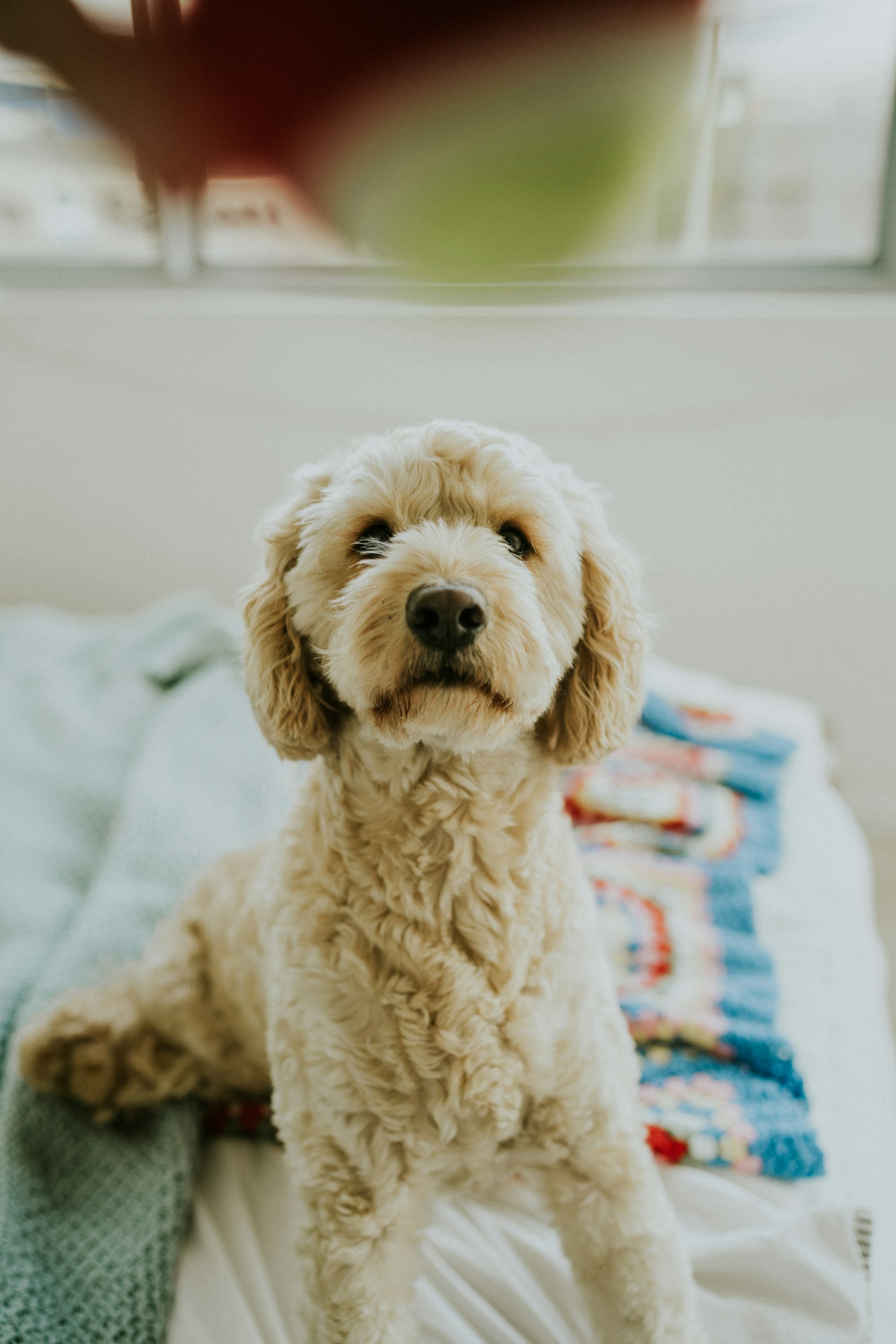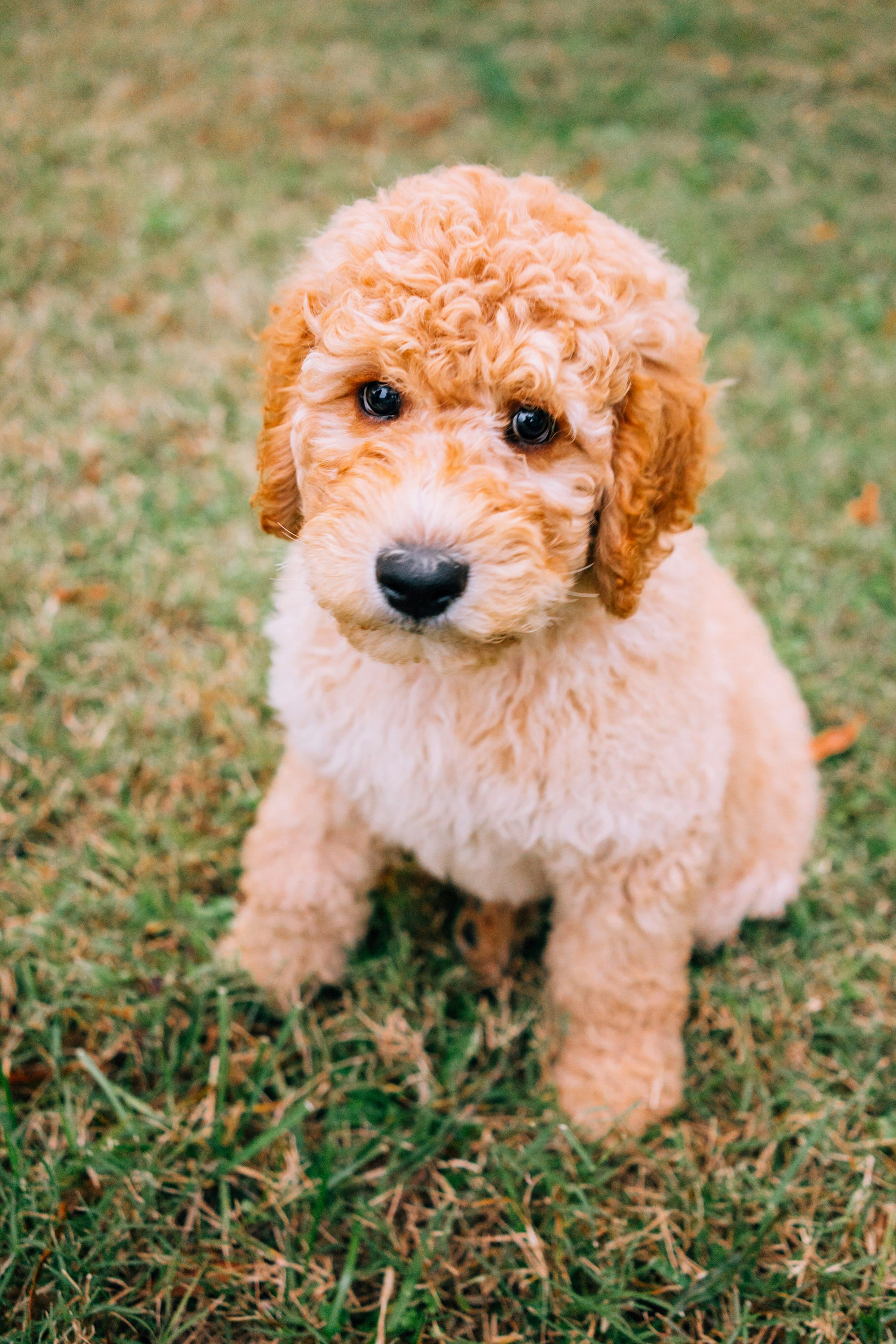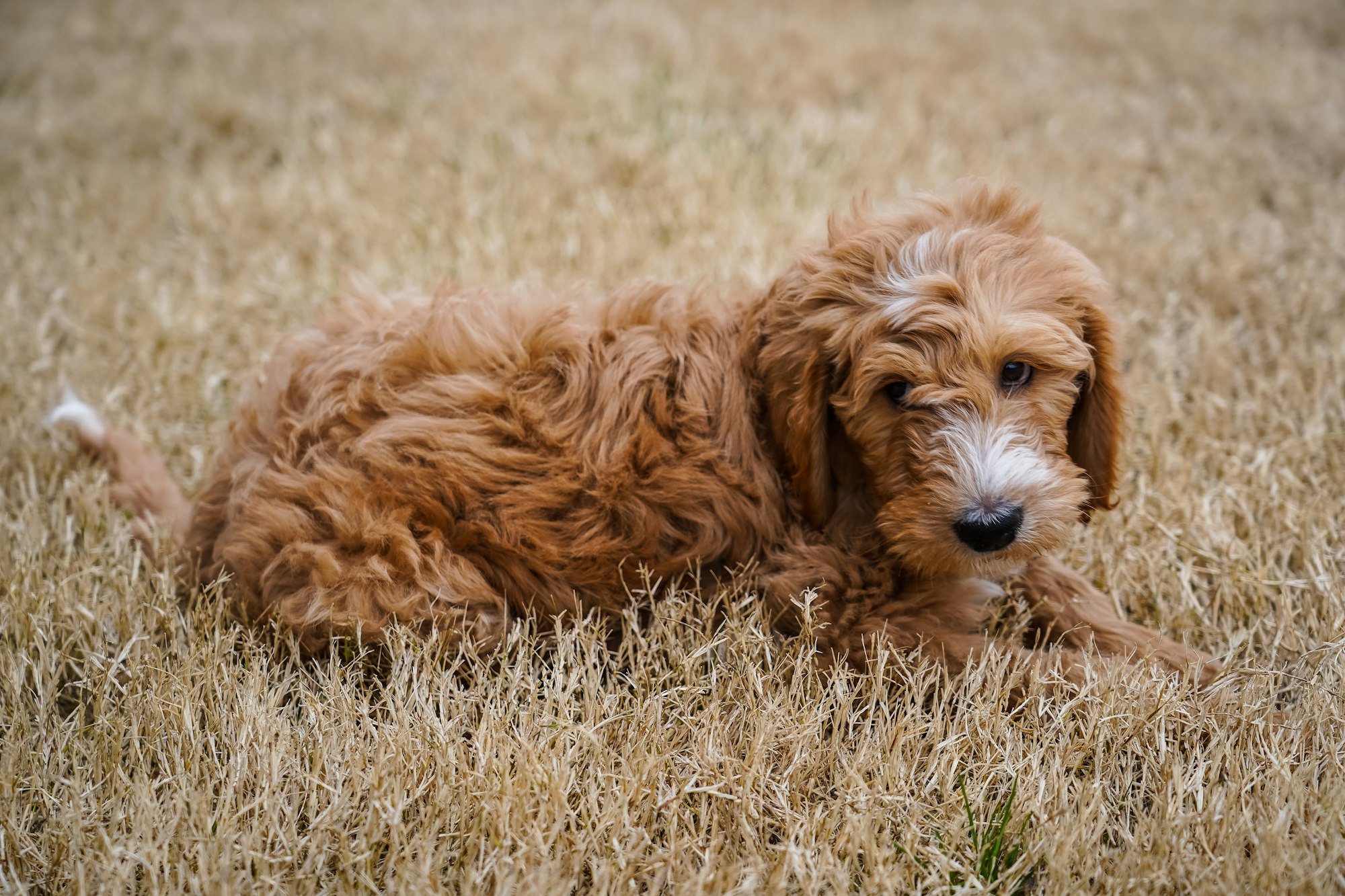Goldendoodles are a popular breed that's often sought after for their hypoallergenic coats. But whether or not they shed depends on the genes of each dog. Because Goldendoodles come from a mix of Golden Retrievers and Poodles, their fur can differ widely from one to the next.
Do Goldendoodles Shed?
Yes, Goldendoodles do shed. They are a hybrid breed that is a mix of the Golden Retriever and Poodle breeds. As such, they have a coat similar to both their parents', which means they may shed more than either the Golden Retriever or Poodle alone. While not hypoallergenic like some other dog breeds, Goldendoodles typically shed much less than many other dogs due to their wavy coats. Regular grooming can help minimize shedding too!
Non-Shedding vs. Hypoallergenic
Goldendoodles are frequently praised for being hypoallergenic and low shedding. Nonetheless, it is essential to keep in mind that no canine strain is completely hypoallergenic. Although they might shed less than other breeds, they still shed to some extent. The degree of shedding is influenced by several factors, including the genetics and coat type of each dog, as well as environmental factors such as the time of year and feeding habits.
How Much Do Goldendoodles Shed?
Goldendoodles are known for their low shedding compared to other breeds. Their coats come in a variety of wavy and curly textures and are composed of hair instead of fur, making them hypoallergenic and less likely to shed. Nonetheless, Goldendoodles need to be groomed regularly to maintain healthy, mat-free coats. Certain types of Goldendoodle coats may require frequent brushing, occasional trimming, or professional grooming appointments.

Which Generations of Goldendoodles Shed?
When it comes to Goldendoodles, shedding levels can vary depending on genetics and coat type, irrespective of the generation they belong to.
Goldendoodles come in varying generations, depending on their parentage. A first-gen (F1) Goldendoodle is produced by crossbreeding a purebred Golden Retriever with a purebred Poodle. F1B Goldendoodles are the outcome of mating an F1 Goldendoodle with a purebred Poodle. Second-gen (F2) Goldendoodles also known as Double Doodles, arise from breeding two F1 Goldendoodles, and so on.
Goldendoodles are known for being low-shedding. However, there can be some slight differences in shedding tendencies among littermates. The degree of shedding is often correlated to the texture of a Goldendoodle's coat, with curlier coats generally resulting in less shedding. In particular, Goldendoodles that are F1B or multigenerational are typically curly and therefore shed less compared to F1 Goldendoodles.
Which Goldendoodles Shed the Least?
When it comes to shedding, F1B and multigenerational Goldendoodles are at the top of the list for being hypoallergenic. F1B's are the result of breeding a purebred Poodle with an F1 Goldendoodle, increasing the likelihood of a curly and low-shed coat. Multigenerational Goldendoodles have been selectively bred over generations, leading to a more uniform coat type and less shedding overall.
It's important to keep in mind that individual dogs can still vary in terms of their shedding, regardless of their generation or coat type. Regular grooming and brushing can also help to minimize shedding in all Goldendoodles.
If you are specifically looking for a Goldendoodle that sheds the least, it's important to work with a reputable breeder who can provide you with information on the dog's genetics and coat type. Additionally, spending time around Goldendoodles before adopting one can help you get a sense of their shedding habits and how they may affect your allergies if you have them.

How Can I Manage My Goldendoodle’s Shedding and Other Skin Issues?
Want to care for your Goldendoodle in the best way possible? Here are some helpful tips:
- Grooming: Take the time to groom your Goldendoodle regularly, and you'll minimize shedding and maximize the health of their coat. Brushing their hair removes loose fur and stops matting.
- Diet: Keep your pet's health in check by feeding them food that is protein-rich and contains healthy fats.
- Bathing: Giving your Goldendoodle a regular bath helps to keep its coat clean and healthy. However, avoid bathing them too frequently, as this can strip natural oils from their skin and result in dryness and discomfort
- Allergies: Allergies can cause your Goldendoodle to experience skin irritation and excessive shedding. Working together with your vet, you can identify the culprit and develop a treatment plan that may include medication or other therapies.
- Environment: The environment in which your Goldendoodle lives can affect its skin and coat. For example, dryness in the air can make them itchy and cause shedding. A humidifier can help with this. Additionally, avoid using harsh cleaning products or other irritants that can worsen skin discomfort.
Brushing
Brushing your Goldendoodle is an essential aspect of their grooming routine, which can help reduce shedding and maintain a healthy, mat-free coat. Here are some simple tips to keep in mind when brushing your Goldendoodle:
- Find the right brush: There are various kinds of brushes available for different coat types. A slicker brush or a pin brush is usually recommended for Goldendoodles because they work well to eliminate loose hair and prevent matting.
- Stay consistent: The amount of times you should brush your Goldendoodle depends on its coat type and how quickly it becomes tangled or matted. In general, it's best to brush your dog once a week, but you may need to brush more frequently if your dog's coat becomes knotted easily.
- Be gentle: Take care to use a gentle touch when brushing your Goldendoodle, and avoid tugging or yanking on their fur. This can cause discomfort and pain for your dog, so if you encounter a knot, use a detangling spray or work through it gently with your fingers before using the brush.
- Be aware of skin problems: While you brush your Goldendoodle, keep an eye out for any signs of skin irritation, such as redness, bumps, or flakes.
- Reward your dog: Brushing can be an amazing bonding experience for both you and your Goldendoodle, so make it a positive experience by providing treats or praise during and after brushing sessions.
Clipping or Shaving
Goldendoodle coat care is a personal decision based on various factors, like your dog's activity level, the climate where you live, and your grooming preferences. To help you make a decision, here are some things you should think about before giving your Goldendoodle a haircut or shaving:
- Coat types: Goldendoodles can have curly, wavy, or straight hair. If your dog has curly or wavy hair, you may not need to cut it since these types of hair are less prone to tangling or matting. If your dog has straight hair, consider shaving it to prevent matting or shedding.
- Climate: If you live in hot areas or your dog spends a lot of time outside during summer, shaving their coat may help keep them cool.
- Activity level: If your dog is outdoorsy and active, their coat may tangle or mat more easily. Clipping or shaving your dog's coat can help reduce this and make it easier to keep it clean and tidy.
Shampoos
Finding the right shampoo for your furry friend is important. When choosing a shampoo for your Goldendoodle, make sure it's specially made for dogs and doesn't contain harsh chemicals that can cause skin irritation. Here are some tips to consider during your selection process:
- Coat type is an important consideration as Goldendoodles have different coat types. Choosing a shampoo that's designed for your dog's specific coat type is key. For instance, curly coat shampoos work best for a Goldendoodle with a curly or wavy coat.
- Skin sensitivities are also important, as some Goldendoodles may have allergies or sensitive skin. Opt for shampoos that are hypoallergenic or formulated for sensitive skin, which is gentle and free of harsh chemicals.
- Natural ingredients like oatmeal or aloe vera can also be beneficial to soothe and moisturize your Goldendoodle's skin, so look for these ingredients. Avoid shampoos containing artificial fragrances or dyes as they can irritate your dog's skin.
- Flea and tick prevention is also a factor. If your Goldendoodle has flea or tick infestations, choose a shampoo that contains natural flea and tick repellents like neem oil or tea tree oil.
- Bear in mind that Goldendoodles should not be bathed too frequently as it can strip their skin of natural oils and cause dryness and irritation. Generally, a bath every 6-8 weeks or as needed depending on their activity level and environment, is enough.
Diet
When it comes to your Goldendoodle's diet, it's important to give them high-quality and nutritious dog food that matches their specific nutritional requirements based on factors like their age, weight, and activity level. Here are some simple tips to keep in mind when choosing a diet for your furry friend:
- Opt for top-notch dog food: Always go for dog food that's made with quality ingredients without any artificial preservatives, flavors, or colors.
- Consider their age and activity level: Puppies have different dietary needs than adult dogs, and energetic pooches need more calories and protein than their lazier counterparts.
- Avoid overfeeding: These dogs can quickly become obese, so it's crucial to stick to the feeding instructions on the dog food packaging and adjust the amount based on your Goldendoodle's specific needs.
- Always hydrate: Make sure your Goldendoodle always has a fresh supply of clean water.
- Supplements can help: Some Goldendoodles may benefit from supplements like omega-3 fatty acids or glucosamine and chondroitin, which can support their joint health, coat, and skin.
- Look out for allergies: Some Goldendoodles may be allergic or sensitive to certain foods, so keep an eye out for signs of digestive or skin problems.
Supplements and Treats
Goldendoodles, those furry pups loved by many, can greatly benefit from a variety of supplements and treats that can positively impact their overall health and well-being. Here are some examples of supplements and treats that are perfect for your Goldendoodle:
- Omega-3 fatty acids: These are easily found in fish oil supplements and can provide significant benefits to the skin and coat of your Goldendoodle.
- Probiotics: Probiotic supplements are just what you need to balance your Goldendoodle's digestive system by promoting healthy gut bacteria, which is essential for their overall health.
- Joint supplements: Older Goldendoodles can be prone to joint problems, but joint supplements that contain glucosamine and chondroitin can work wonders to support joint health and mobility.
- Dental chews: Dental chews are perfect for keeping your furry pet's teeth clean, all while giving them a tasty treat.
- Training treats: Treats can be used as a reward for good behavior during training sessions to make them more productive and enjoyable.

Q: Do Goldendoodles shed more in summer or winter?
Goldendoodles might shed all year long, but how much they shed depends on each dog and the season. In general, Goldendoodles might shed more in the spring and fall as their coats adjust from winter to summer. These times may see them shed their heavier winter undercoats to prepare for warmer weather. That said, it's worth noting that Goldendoodles with curly or wavy coats may not shed as heavily as those with straighter coats.
Q: Are Goldendoodle coats high maintenance?
Most people consider Goldendoodle fur to be pretty high maintenance since they are woolly, and their curly coats need consistent grooming and trimming to avoid tangling and matting. This suggests that they need a daily brushing routine to keep their fur looking good, and professional grooming every 6-8 weeks to maintain its overall health and aesthetic.
Moreover, Goldendoodles might need more frequent grooming during seasonal shedding periods to prevent excessive hair loss and preserve their coat's health. Despite the upkeep required, many Goldendoodle enthusiasts believe that it's all worthwhile, given their cute looks and amiable personalities.
Q: What if your Goldendoodle is shedding more than usual?
If your Goldendoodle is shedding more than usual, there could be a few different causes. First, make sure you're providing them with a healthy diet full of essential vitamins and minerals to ensure their coat stays nourished. Additionally, brushing their fur regularly can help reduce excessive shedding by removing loose hairs from the undercoat and preventing matting. Finally, keep an eye out for signs of skin irritation or allergies that may be causing increased hair loss. If you suspect this might be the case, consult your vet right away so they can determine the best course of action.

Final Thoughts
So, to wrap things up, Goldendoodles are often marketed as furry friends that won't trigger allergies or leave hair around the house. However, it's crucial to keep in mind that no breed of dog can guarantee to be completely hypoallergenic. The amount of hair shed by these adorable canines can change depending on the specific pooch's genes and fur type, as well as external factors like weather and nourishment.
Get more expert advice on pet-parenting by visiting the Off Leash blog at TryFi.com.
TryFi's The Fi Dog Collar is a must-have for any pet parent, it's a GPS tracking collar that helps you keep tabs on your dog's location, activity, and sleep patterns, and alerts you if they escape your backyard. Try the Fi Dog Collar today!

